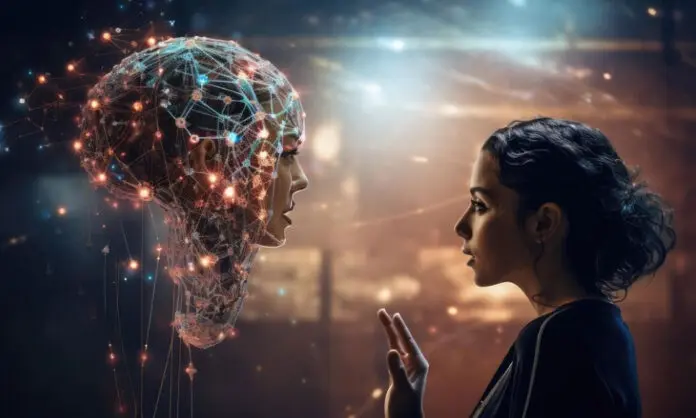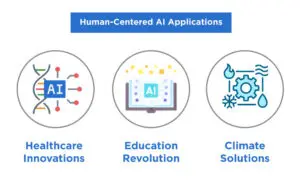The world today is teeming with technological development; the integration of AI has clearly shown us the number of unprecedented possibilities. Whilst all this is happening, we need to take a breather and look at people, as they are the ones who truly matter. Human-centered AI is not just a topic to talk about, but a philosophy.
What is Human-Centered AI?
At its core, AI systems is a philosophy and practice of designing artificial intelligence systems that prioritize human well-being. It incorporates justice, accessibility, and ethical standards to make sure that technical advancements reflect society’s ideals.
For instance, consider AI in healthcare. Rather than replacing doctors, a Human-Centered AI model enhances their decision-making by providing accurate diagnostics, recommending treatments, and personalizing patient care. This synergy allows technology to amplify human expertise without sidelining it.
The Benefits of People-First Technology
- Improved Accessibility
One of the most remarkable outcomes of Human-Centered AI is the way it bridges gaps for marginalized groups. From voice-activated devices that assist the elderly to AI-powered translators breaking down language barriers, this approach ensures inclusivity.
For example, visually impaired individuals now benefit from apps that describe their surroundings using AI. This empowerment illustrates how technology can be transformative when designed with empathy.
- Ethical Decision-Making
Ethics play a critical role in shaping technology’s impact. Human-Centered AI ensures transparency and accountability in decision-making. Algorithms are designed to minimize bias, protect privacy, and align with societal norms.
Take autonomous vehicles as an example. Human-Centered AI ensures these vehicles prioritize safety and fairness when making split-second decisions, ultimately building trust in such innovations.
- Enhanced Collaboration Between Humans and Machines
Instead of replacing human roles, AI systems enhances them. In workplaces, AI can automate repetitive tasks, freeing employees to focus on creativity, problem-solving, and relationship-building. This collaborative approach strengthens productivity while maintaining human relevance.
For instance, Human-Centered AI in customer service uses chatbots to handle basic queries while human representatives tackle complex issues. Such synergy ensures better service without overwhelming employees.
Real-World Applications of Human-Centered AI
- Healthcare Innovations: AI models are aiding doctors in diagnosing diseases like cancer earlier, saving lives and improving patient outcomes. By focusing on human needs, these tools provide support without eroding patient-doctor relationships.
- Education Revolution: AI-powered platforms personalize learning by adapting to individual student needs, making education more engaging and effective. Teachers benefit by receiving insights into student performance, enabling targeted interventions.
- Climate Solutions: From predicting natural disasters to optimizing energy consumption, Human-Centered AI is a game-changer in the fight against climate change. By leveraging AI to address environmental challenges, societies can create a sustainable future.
Challenges and the Path Forward
While the potential of AI is immense, its journey is not without obstacles. Concerns about data privacy, algorithmic bias, and over-dependence on technology often emerge as significant challenges.
To address these, organizations and policymakers must adopt a multi-pronged approach:
- Ethical Governance: Establish clear guidelines that hold AI systems accountable for their decisions.
- Public Awareness: Educate users about AI’s capabilities and limitations to foster trust and responsible use.
- Interdisciplinary Collaboration: Involve ethicists, psychologists, and sociologists alongside technologists to create well-rounded AI systems.
By tackling these hurdles, we can ensure Human-Centered AI achieves its full potential while mitigating risks.
Why AI is Key to a Better Tomorrow
As we look toward the future, Human-Centered AI offers a vision of technology that uplifts humanity rather than overpowering it. This people-first approach ensures that advancements serve the collective good, fostering equity, empathy, and sustainability.
From healthcare to education, its applications prove that innovation does not have to come at the cost of human values. By keeping people at the center of technological development, we can build a world where progress and compassion go hand in hand.
Human-Centered AI is not just a trend and it’s a necessity for shaping a better tomorrow. Embracing this approach allows us to harness the power of AI responsibly, ensuring technology remains a tool for human empowerment rather than domination.
Read More:


